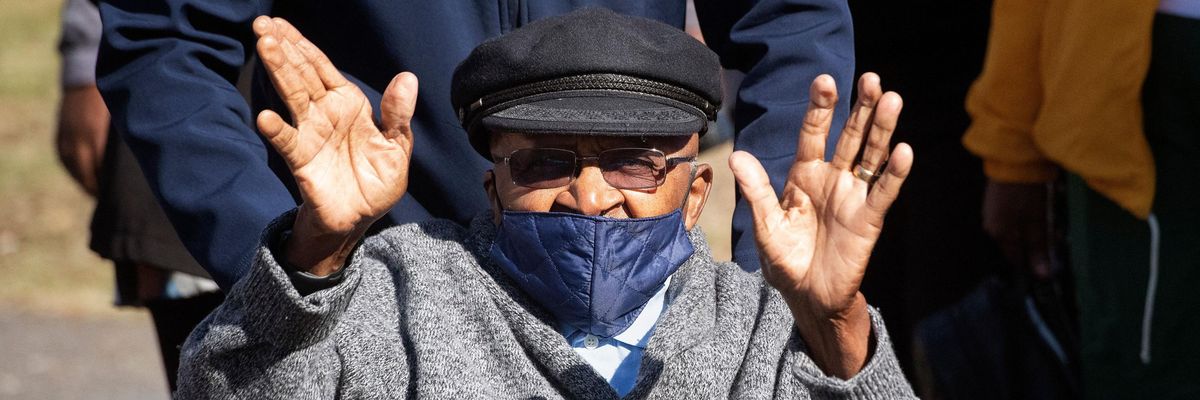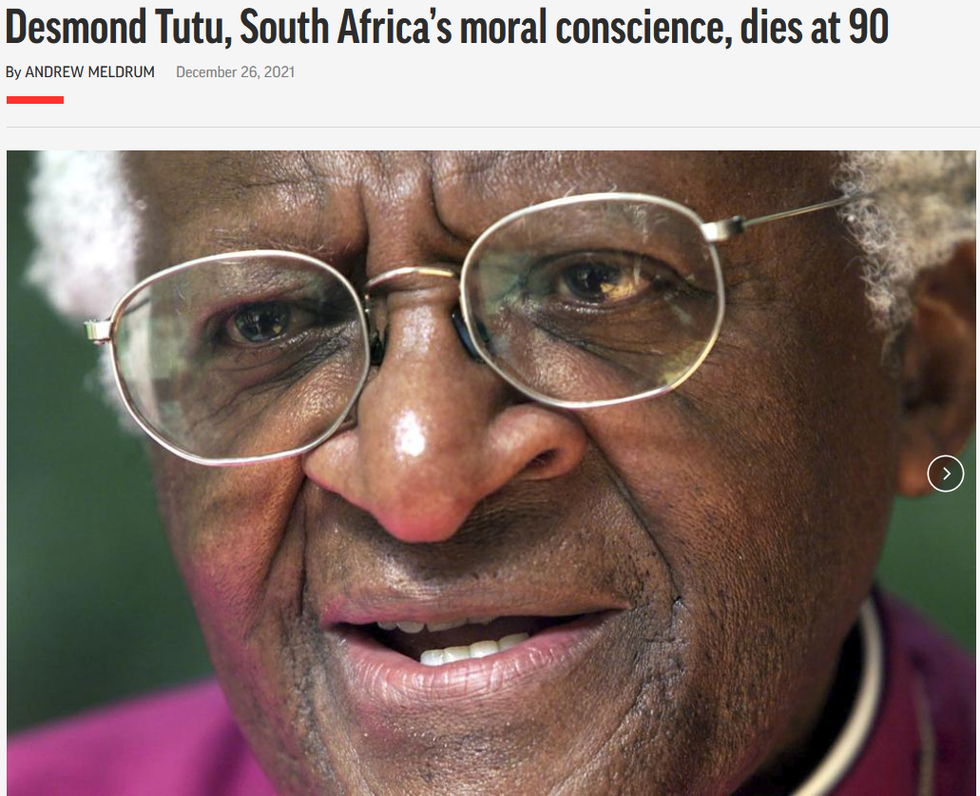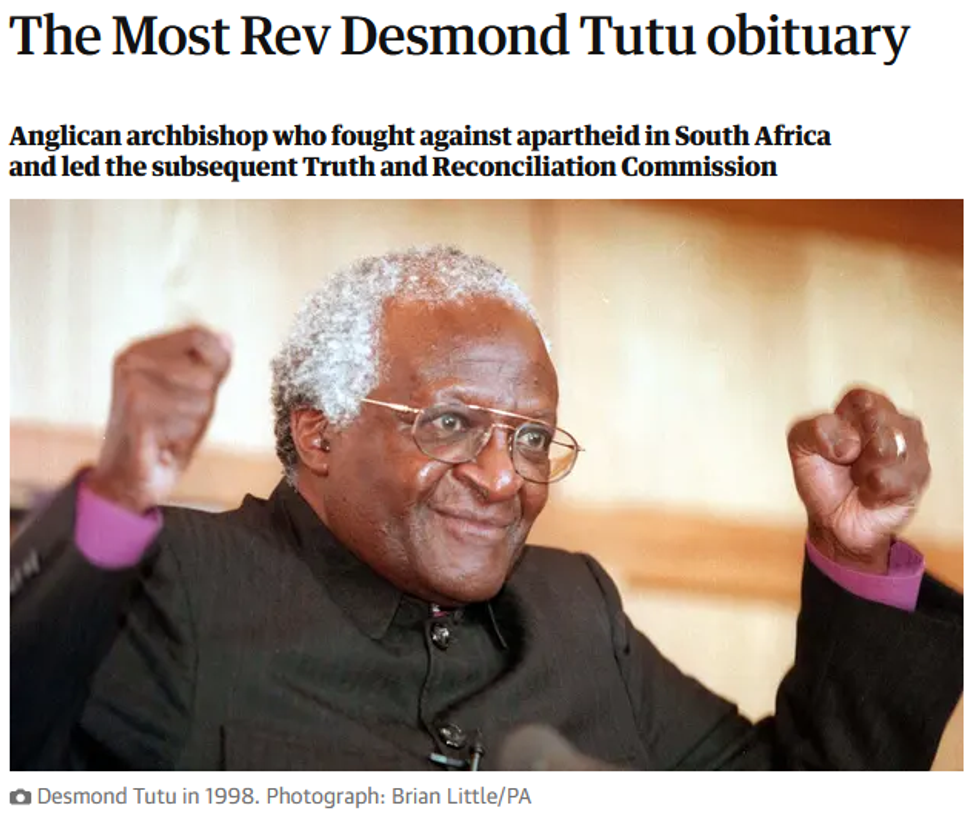

SUBSCRIBE TO OUR FREE NEWSLETTER
Daily news & progressive opinion—funded by the people, not the corporations—delivered straight to your inbox.
5
#000000
#FFFFFF
To donate by check, phone, or other method, see our More Ways to Give page.


Daily news & progressive opinion—funded by the people, not the corporations—delivered straight to your inbox.

Desmond Tutu, Archbishop Emeritus and Nobel Peace Laureate, greets wellwishers as he is wheeled out of the Brooklyn Chest Hospital, after being vaccinated against COVID 19, in Cape Town, on May 17, 2021. (Photo by Rodger Bosch/AFP via Getty Images)
Obituaries in the corporate and establishment press for South African Archbishop Desmond Tutu rightly celebrated him not only as one of the key leaders of the struggle against apartheid in his own country, but as a global advocate against oppression, including being a fierce Christian voice against homophobia.

AP (12/26/21) noted that Desmond Tutu "campaigned internationally for human rights"--but didn't mention Israel/Palestine.
These obituaries often underplayed or ignored, however, that Tutu, as a South African crusader against apartheid, helped to normalize the idea that Palestinians suffered under a similar apartheid system. Likewise marginalized was the enormous amount of hate he received for his advocacy for Palestinians and his criticism of the Israeli government.
The New York Times (12/26/21) obituary reduced his Palestine advocacy to one incident in 2010 when "he unsuccessfully urged a touring Cape Town opera company" to not perform in the country, quoting his urging the company to postpone its production of Porgy and Bess "until both Israeli and Palestinian opera lovers of the region have equal opportunity and unfettered access to attend performances."
The AP obituary (12/26/21) ignored this issue entirely, as did obituaries in USA Today (12/26/21), the BBC (12/26/21) and NPR (12/26/21). The Washington Post (12/26/21) did the issue some justice, saying that Tutu "repeatedly compared Israel's treatment of Palestinians in the West Bank and Gaza to South Africa during the apartheid regime." While CNN's initial obituary (12/26/21) devoted only part of a sentence to his call for a boycott of Israel in 2014, a follow-up piece explored his broad range of activism: "As South Africa Mourns Desmond Tutu, So Do LGBTQ Groups, Palestinians and Climate Activists" (11/27/21).

Critics complained that the Guardian's obituary (12/26/21) contained all of four words on Desmond Tutu's criticism of Israel. The paper later printed an op-ed (12/30/21) on his advocacy for Palestinians.
As of this writing, more than 3,000 people had signed a petition demanding a correction to the Guardian's obituary (12/26/21). Petitioners complained that while the obit:
documents the archbishop's tireless struggle against oppression and racism of all kinds...Tutu's repeated criticism of Israeli apartheid policies, and his commitment to the cause of the Palestinian people, are all simply omitted.
The article's lone mention of Israel cited Tutu's blasting "the US for supporting the Contras in Nicaragua and Israel for bombing Beirut." The petition said that the article "exemplifies the Guardian's consistent pro-Israel bias," a trend FAIR has previously documented (2/22/21). According to the Palestine Solidarity Campaign (12/30/21), activists were concerned with the Guardian's "deletion of a large number of comments in response to the obituary which all highlighted Tutu's condemnation of Israeli apartheid." The comments were restored upon pressure, the group said, but the original deletion, the group said, still inspired unease.
This backlash is rooted in the idea that advocacy for the Palestinians must be antisemitic because Israel is an officially Jewish state--an idea that borrows from the now-ridiculous notion that fighting apartheid in South Africa was somehow anti-white.
The Guardian (12/30/21) did eventually publish a piece on Tutu's Palestine activism, in an apparent response to the media activism.
As the Middle East Eye (12/26/21) reported, Tutu likened Palestinians' political conditions to those of Black South Africans under apartheid. He supported the boycott, divestment and sanctions (BDS) campaign as a form of peaceful pressure, and often spoke of Israel's policies as being contrary to the teachings of Jewish and Christian values.
Upon his death, the Israeli newspaper Ha'aretz (12/26/21) quoted Tutu's defense of boycotting Israel, saying those who continue to do business with Israel "are contributing to the perpetuation of a profoundly unjust status quo." "Those who contribute to Israel's temporary isolation," meanwhile, "are saying that Israelis and Palestinians are equally entitled to dignity and peace."

Alan Dershowitz on Fox News (12/27/21): "Let's make sure that history remembers both the goods he did and the awful, awful bads that he did as well."
Skating over Tutu's outspokenness about Palestinian rights in his official obituaries does a disservice to Tutu's life, as his intense advocacy for Palestinians was a major part of his devotion to social justice, and like all campaigns for social justice, it inspired reactionary pushback from defenders of the status quo.
The pro-Israel Anti-Defamation League (5/3/12) said that he "veered into classical religion-based antisemitism" with his condemnation of Israel's treatment of Palestinians. AP (10/4/07) reported that Tutu had even been disinvited from speaking at a university because the administration "worried his views on the Israeli/Palestinian conflict would offend the Jewish community."
The London Times (1/13/11) reported that a petition "signed by three well-known members of Cape Town's Jewish community" accused Tutu of being a "bigot, dishonest, and a defamer of Israel and the Jewish community." "Over the years," they said, "Archbishop Tutu has been guilty of numerous antisemitic and anti-Israel statements."
Alan Dershowitz--lawyer for Donald Trump, Harvey Weinstein and Jeffrey Epstein--even took to Fox News (12/27/21; Crooks & Liars, 12/28/21) to dance on Tutu's grave: "Can I remind the world that...the man was a rampant antisemite and bigot?"
This backlash is rooted in the idea that advocacy for the Palestinians must be antisemitic because Israel is an officially Jewish state--an idea that borrows from the now-ridiculous notion that fighting apartheid in South Africa was somehow anti-white. The Jewish Telegraphic Agency's obituary (12/26/21) highlighted this absurdity, saying Tutu "identified closely with the historical suffering of the Jewish people in his forceful advocacy against apartheid in South Africa."
Underplaying this aspect of Tutu's life also understates his impact, because it was Tutu, as a hero of South African liberation struggle, who gave major legitimacy to both the movement to boycott Israel and to critics who labeled Israel's occupation as apartheid. Tutu's early recognition that Israel's anti-Palestinian policies mirrored what he had campaigned against in South Africa laid the groundwork for human rights groups like Human Rights Watch (New York Times, 4/27/21) and B'Tselem (NBC, 1/12/21) to recognize Israel's occupation as a form of apartheid.
The omission or underplaying of this facet of Tutu's life is a reminder of how scared many corporate media institutions are of touching what is often called the third rail of politics. That the AP's obituary, for example, can highlight Tutu's heroic commitment against homophobia but not his views on the Israel/Palestine conflict, or the backlash he faced as a result, underscores the limits of intersectional social justice in the establishment press.
Dear Common Dreams reader, The U.S. is on a fast track to authoritarianism like nothing I've ever seen. Meanwhile, corporate news outlets are utterly capitulating to Trump, twisting their coverage to avoid drawing his ire while lining up to stuff cash in his pockets. That's why I believe that Common Dreams is doing the best and most consequential reporting that we've ever done. Our small but mighty team is a progressive reporting powerhouse, covering the news every day that the corporate media never will. Our mission has always been simple: To inform. To inspire. And to ignite change for the common good. Now here's the key piece that I want all our readers to understand: None of this would be possible without your financial support. That's not just some fundraising cliche. It's the absolute and literal truth. We don't accept corporate advertising and never will. We don't have a paywall because we don't think people should be blocked from critical news based on their ability to pay. Everything we do is funded by the donations of readers like you. Will you donate now to help power the nonprofit, independent reporting of Common Dreams? Thank you for being a vital member of our community. Together, we can keep independent journalism alive when it’s needed most. - Craig Brown, Co-founder |
Obituaries in the corporate and establishment press for South African Archbishop Desmond Tutu rightly celebrated him not only as one of the key leaders of the struggle against apartheid in his own country, but as a global advocate against oppression, including being a fierce Christian voice against homophobia.

AP (12/26/21) noted that Desmond Tutu "campaigned internationally for human rights"--but didn't mention Israel/Palestine.
These obituaries often underplayed or ignored, however, that Tutu, as a South African crusader against apartheid, helped to normalize the idea that Palestinians suffered under a similar apartheid system. Likewise marginalized was the enormous amount of hate he received for his advocacy for Palestinians and his criticism of the Israeli government.
The New York Times (12/26/21) obituary reduced his Palestine advocacy to one incident in 2010 when "he unsuccessfully urged a touring Cape Town opera company" to not perform in the country, quoting his urging the company to postpone its production of Porgy and Bess "until both Israeli and Palestinian opera lovers of the region have equal opportunity and unfettered access to attend performances."
The AP obituary (12/26/21) ignored this issue entirely, as did obituaries in USA Today (12/26/21), the BBC (12/26/21) and NPR (12/26/21). The Washington Post (12/26/21) did the issue some justice, saying that Tutu "repeatedly compared Israel's treatment of Palestinians in the West Bank and Gaza to South Africa during the apartheid regime." While CNN's initial obituary (12/26/21) devoted only part of a sentence to his call for a boycott of Israel in 2014, a follow-up piece explored his broad range of activism: "As South Africa Mourns Desmond Tutu, So Do LGBTQ Groups, Palestinians and Climate Activists" (11/27/21).

Critics complained that the Guardian's obituary (12/26/21) contained all of four words on Desmond Tutu's criticism of Israel. The paper later printed an op-ed (12/30/21) on his advocacy for Palestinians.
As of this writing, more than 3,000 people had signed a petition demanding a correction to the Guardian's obituary (12/26/21). Petitioners complained that while the obit:
documents the archbishop's tireless struggle against oppression and racism of all kinds...Tutu's repeated criticism of Israeli apartheid policies, and his commitment to the cause of the Palestinian people, are all simply omitted.
The article's lone mention of Israel cited Tutu's blasting "the US for supporting the Contras in Nicaragua and Israel for bombing Beirut." The petition said that the article "exemplifies the Guardian's consistent pro-Israel bias," a trend FAIR has previously documented (2/22/21). According to the Palestine Solidarity Campaign (12/30/21), activists were concerned with the Guardian's "deletion of a large number of comments in response to the obituary which all highlighted Tutu's condemnation of Israeli apartheid." The comments were restored upon pressure, the group said, but the original deletion, the group said, still inspired unease.
This backlash is rooted in the idea that advocacy for the Palestinians must be antisemitic because Israel is an officially Jewish state--an idea that borrows from the now-ridiculous notion that fighting apartheid in South Africa was somehow anti-white.
The Guardian (12/30/21) did eventually publish a piece on Tutu's Palestine activism, in an apparent response to the media activism.
As the Middle East Eye (12/26/21) reported, Tutu likened Palestinians' political conditions to those of Black South Africans under apartheid. He supported the boycott, divestment and sanctions (BDS) campaign as a form of peaceful pressure, and often spoke of Israel's policies as being contrary to the teachings of Jewish and Christian values.
Upon his death, the Israeli newspaper Ha'aretz (12/26/21) quoted Tutu's defense of boycotting Israel, saying those who continue to do business with Israel "are contributing to the perpetuation of a profoundly unjust status quo." "Those who contribute to Israel's temporary isolation," meanwhile, "are saying that Israelis and Palestinians are equally entitled to dignity and peace."

Alan Dershowitz on Fox News (12/27/21): "Let's make sure that history remembers both the goods he did and the awful, awful bads that he did as well."
Skating over Tutu's outspokenness about Palestinian rights in his official obituaries does a disservice to Tutu's life, as his intense advocacy for Palestinians was a major part of his devotion to social justice, and like all campaigns for social justice, it inspired reactionary pushback from defenders of the status quo.
The pro-Israel Anti-Defamation League (5/3/12) said that he "veered into classical religion-based antisemitism" with his condemnation of Israel's treatment of Palestinians. AP (10/4/07) reported that Tutu had even been disinvited from speaking at a university because the administration "worried his views on the Israeli/Palestinian conflict would offend the Jewish community."
The London Times (1/13/11) reported that a petition "signed by three well-known members of Cape Town's Jewish community" accused Tutu of being a "bigot, dishonest, and a defamer of Israel and the Jewish community." "Over the years," they said, "Archbishop Tutu has been guilty of numerous antisemitic and anti-Israel statements."
Alan Dershowitz--lawyer for Donald Trump, Harvey Weinstein and Jeffrey Epstein--even took to Fox News (12/27/21; Crooks & Liars, 12/28/21) to dance on Tutu's grave: "Can I remind the world that...the man was a rampant antisemite and bigot?"
This backlash is rooted in the idea that advocacy for the Palestinians must be antisemitic because Israel is an officially Jewish state--an idea that borrows from the now-ridiculous notion that fighting apartheid in South Africa was somehow anti-white. The Jewish Telegraphic Agency's obituary (12/26/21) highlighted this absurdity, saying Tutu "identified closely with the historical suffering of the Jewish people in his forceful advocacy against apartheid in South Africa."
Underplaying this aspect of Tutu's life also understates his impact, because it was Tutu, as a hero of South African liberation struggle, who gave major legitimacy to both the movement to boycott Israel and to critics who labeled Israel's occupation as apartheid. Tutu's early recognition that Israel's anti-Palestinian policies mirrored what he had campaigned against in South Africa laid the groundwork for human rights groups like Human Rights Watch (New York Times, 4/27/21) and B'Tselem (NBC, 1/12/21) to recognize Israel's occupation as a form of apartheid.
The omission or underplaying of this facet of Tutu's life is a reminder of how scared many corporate media institutions are of touching what is often called the third rail of politics. That the AP's obituary, for example, can highlight Tutu's heroic commitment against homophobia but not his views on the Israel/Palestine conflict, or the backlash he faced as a result, underscores the limits of intersectional social justice in the establishment press.
Obituaries in the corporate and establishment press for South African Archbishop Desmond Tutu rightly celebrated him not only as one of the key leaders of the struggle against apartheid in his own country, but as a global advocate against oppression, including being a fierce Christian voice against homophobia.

AP (12/26/21) noted that Desmond Tutu "campaigned internationally for human rights"--but didn't mention Israel/Palestine.
These obituaries often underplayed or ignored, however, that Tutu, as a South African crusader against apartheid, helped to normalize the idea that Palestinians suffered under a similar apartheid system. Likewise marginalized was the enormous amount of hate he received for his advocacy for Palestinians and his criticism of the Israeli government.
The New York Times (12/26/21) obituary reduced his Palestine advocacy to one incident in 2010 when "he unsuccessfully urged a touring Cape Town opera company" to not perform in the country, quoting his urging the company to postpone its production of Porgy and Bess "until both Israeli and Palestinian opera lovers of the region have equal opportunity and unfettered access to attend performances."
The AP obituary (12/26/21) ignored this issue entirely, as did obituaries in USA Today (12/26/21), the BBC (12/26/21) and NPR (12/26/21). The Washington Post (12/26/21) did the issue some justice, saying that Tutu "repeatedly compared Israel's treatment of Palestinians in the West Bank and Gaza to South Africa during the apartheid regime." While CNN's initial obituary (12/26/21) devoted only part of a sentence to his call for a boycott of Israel in 2014, a follow-up piece explored his broad range of activism: "As South Africa Mourns Desmond Tutu, So Do LGBTQ Groups, Palestinians and Climate Activists" (11/27/21).

Critics complained that the Guardian's obituary (12/26/21) contained all of four words on Desmond Tutu's criticism of Israel. The paper later printed an op-ed (12/30/21) on his advocacy for Palestinians.
As of this writing, more than 3,000 people had signed a petition demanding a correction to the Guardian's obituary (12/26/21). Petitioners complained that while the obit:
documents the archbishop's tireless struggle against oppression and racism of all kinds...Tutu's repeated criticism of Israeli apartheid policies, and his commitment to the cause of the Palestinian people, are all simply omitted.
The article's lone mention of Israel cited Tutu's blasting "the US for supporting the Contras in Nicaragua and Israel for bombing Beirut." The petition said that the article "exemplifies the Guardian's consistent pro-Israel bias," a trend FAIR has previously documented (2/22/21). According to the Palestine Solidarity Campaign (12/30/21), activists were concerned with the Guardian's "deletion of a large number of comments in response to the obituary which all highlighted Tutu's condemnation of Israeli apartheid." The comments were restored upon pressure, the group said, but the original deletion, the group said, still inspired unease.
This backlash is rooted in the idea that advocacy for the Palestinians must be antisemitic because Israel is an officially Jewish state--an idea that borrows from the now-ridiculous notion that fighting apartheid in South Africa was somehow anti-white.
The Guardian (12/30/21) did eventually publish a piece on Tutu's Palestine activism, in an apparent response to the media activism.
As the Middle East Eye (12/26/21) reported, Tutu likened Palestinians' political conditions to those of Black South Africans under apartheid. He supported the boycott, divestment and sanctions (BDS) campaign as a form of peaceful pressure, and often spoke of Israel's policies as being contrary to the teachings of Jewish and Christian values.
Upon his death, the Israeli newspaper Ha'aretz (12/26/21) quoted Tutu's defense of boycotting Israel, saying those who continue to do business with Israel "are contributing to the perpetuation of a profoundly unjust status quo." "Those who contribute to Israel's temporary isolation," meanwhile, "are saying that Israelis and Palestinians are equally entitled to dignity and peace."

Alan Dershowitz on Fox News (12/27/21): "Let's make sure that history remembers both the goods he did and the awful, awful bads that he did as well."
Skating over Tutu's outspokenness about Palestinian rights in his official obituaries does a disservice to Tutu's life, as his intense advocacy for Palestinians was a major part of his devotion to social justice, and like all campaigns for social justice, it inspired reactionary pushback from defenders of the status quo.
The pro-Israel Anti-Defamation League (5/3/12) said that he "veered into classical religion-based antisemitism" with his condemnation of Israel's treatment of Palestinians. AP (10/4/07) reported that Tutu had even been disinvited from speaking at a university because the administration "worried his views on the Israeli/Palestinian conflict would offend the Jewish community."
The London Times (1/13/11) reported that a petition "signed by three well-known members of Cape Town's Jewish community" accused Tutu of being a "bigot, dishonest, and a defamer of Israel and the Jewish community." "Over the years," they said, "Archbishop Tutu has been guilty of numerous antisemitic and anti-Israel statements."
Alan Dershowitz--lawyer for Donald Trump, Harvey Weinstein and Jeffrey Epstein--even took to Fox News (12/27/21; Crooks & Liars, 12/28/21) to dance on Tutu's grave: "Can I remind the world that...the man was a rampant antisemite and bigot?"
This backlash is rooted in the idea that advocacy for the Palestinians must be antisemitic because Israel is an officially Jewish state--an idea that borrows from the now-ridiculous notion that fighting apartheid in South Africa was somehow anti-white. The Jewish Telegraphic Agency's obituary (12/26/21) highlighted this absurdity, saying Tutu "identified closely with the historical suffering of the Jewish people in his forceful advocacy against apartheid in South Africa."
Underplaying this aspect of Tutu's life also understates his impact, because it was Tutu, as a hero of South African liberation struggle, who gave major legitimacy to both the movement to boycott Israel and to critics who labeled Israel's occupation as apartheid. Tutu's early recognition that Israel's anti-Palestinian policies mirrored what he had campaigned against in South Africa laid the groundwork for human rights groups like Human Rights Watch (New York Times, 4/27/21) and B'Tselem (NBC, 1/12/21) to recognize Israel's occupation as a form of apartheid.
The omission or underplaying of this facet of Tutu's life is a reminder of how scared many corporate media institutions are of touching what is often called the third rail of politics. That the AP's obituary, for example, can highlight Tutu's heroic commitment against homophobia but not his views on the Israel/Palestine conflict, or the backlash he faced as a result, underscores the limits of intersectional social justice in the establishment press.